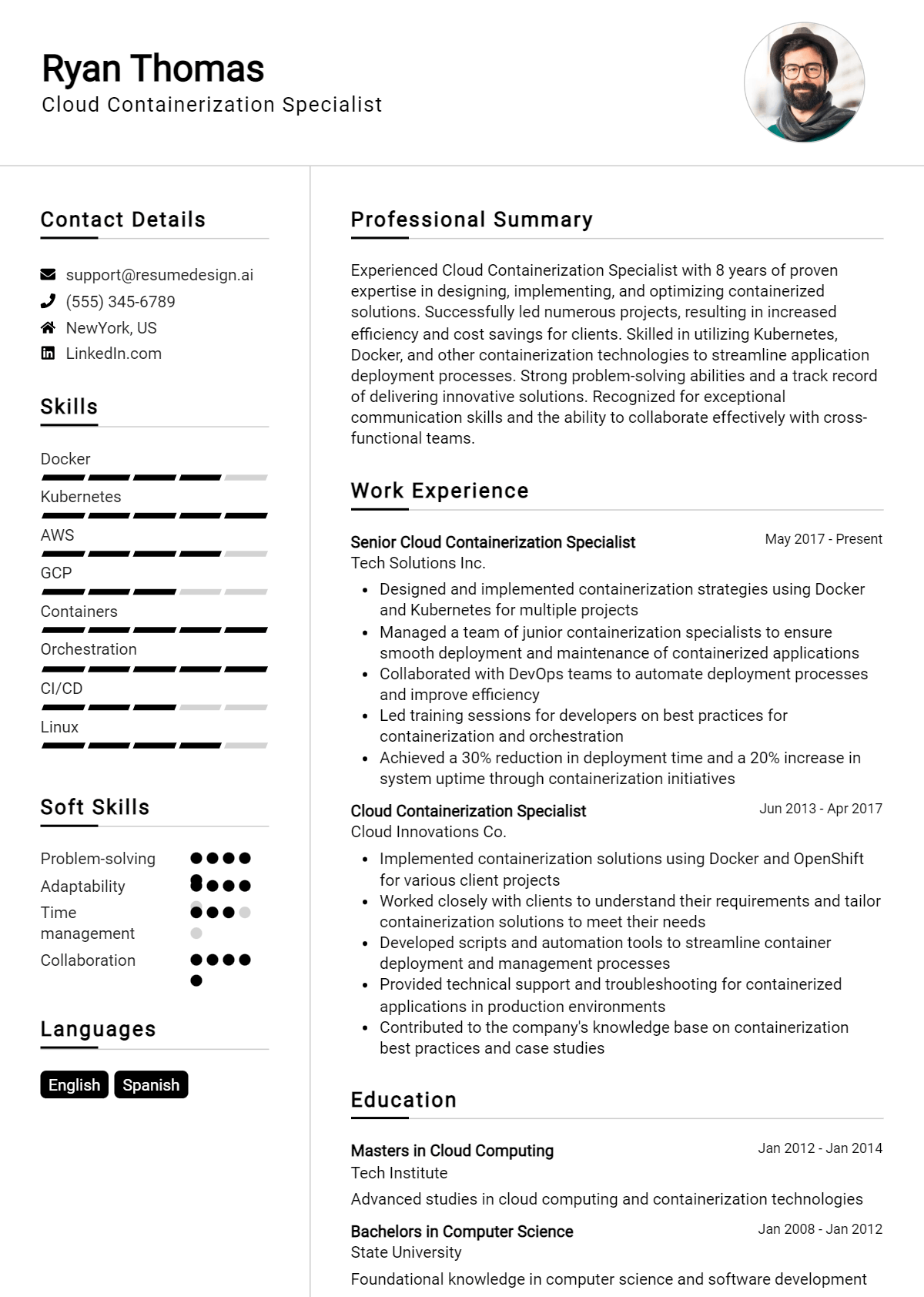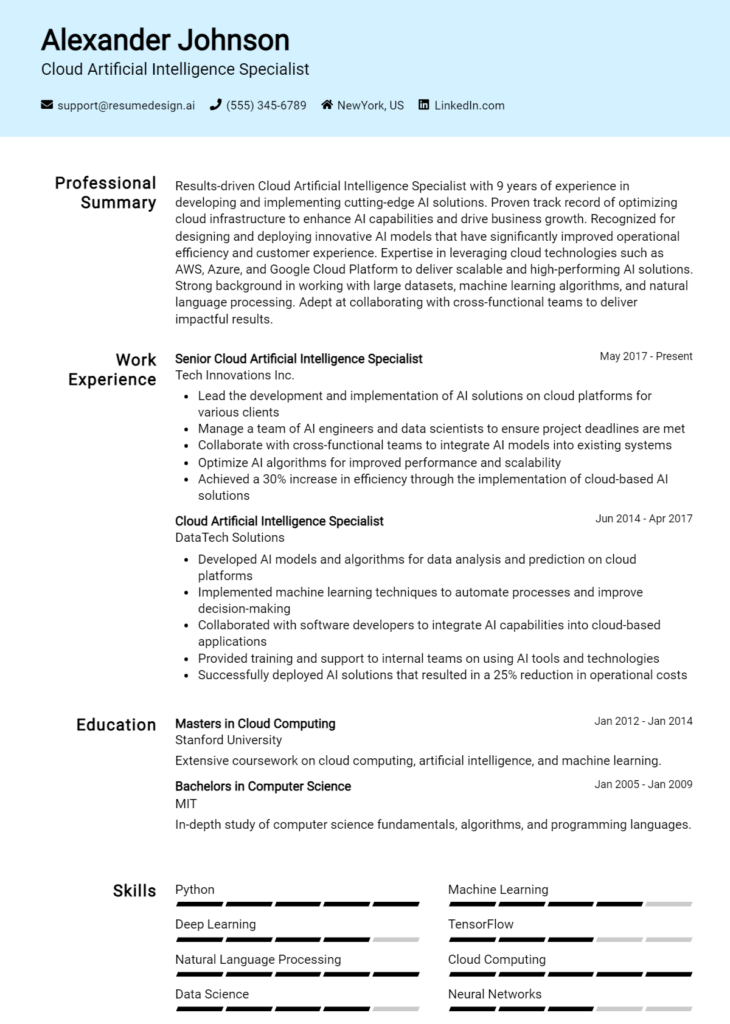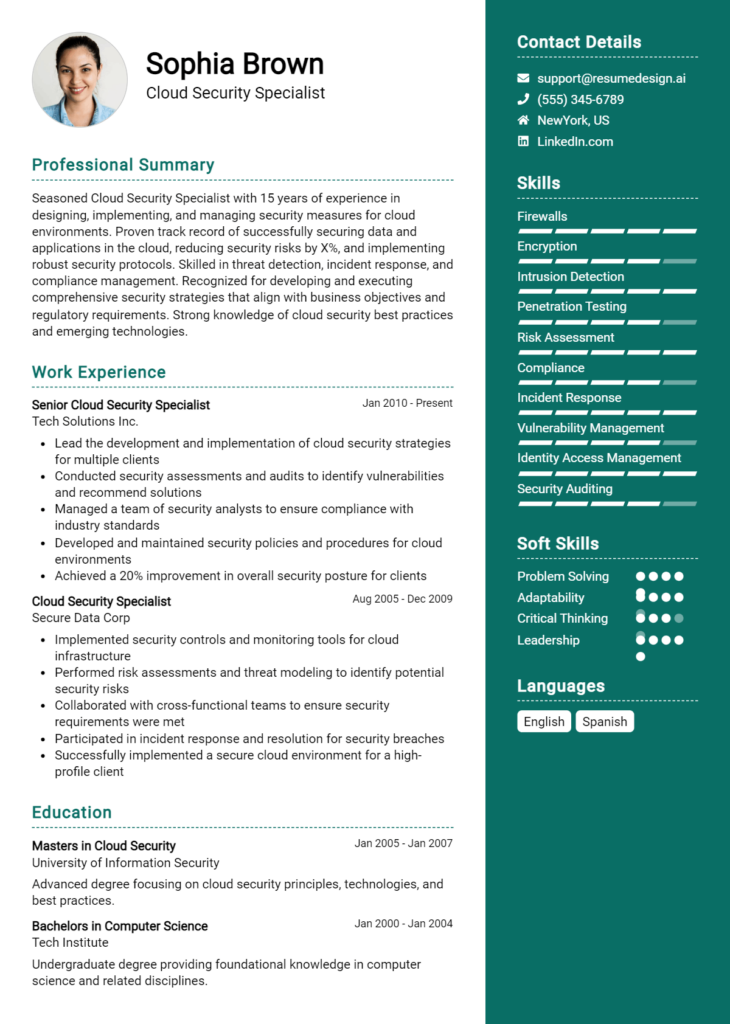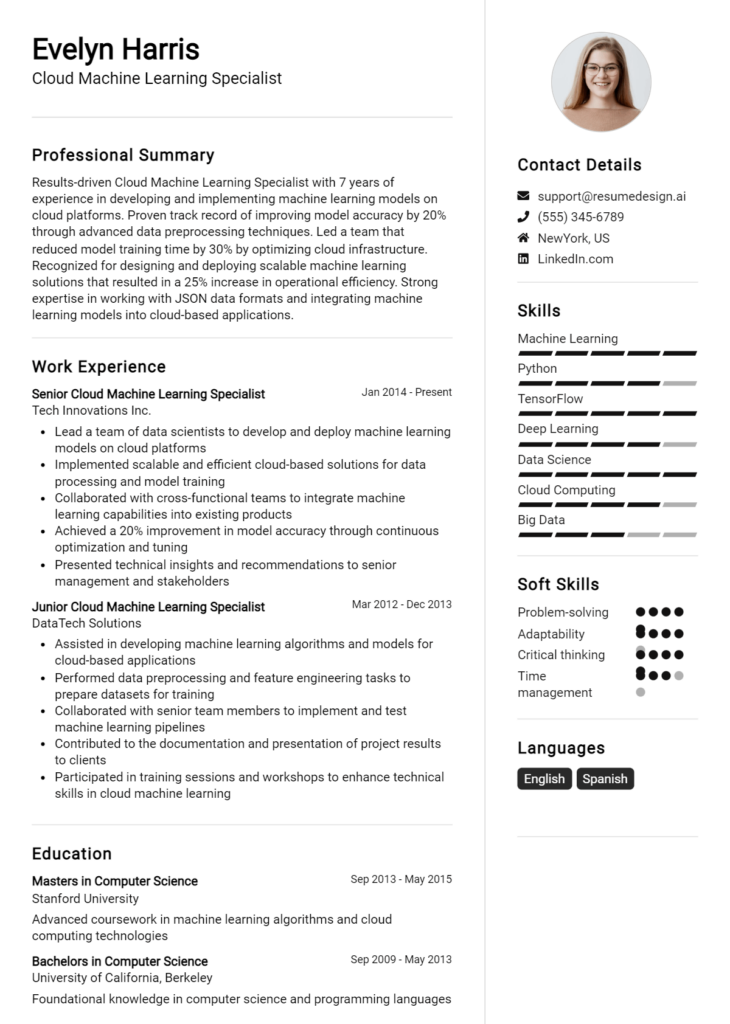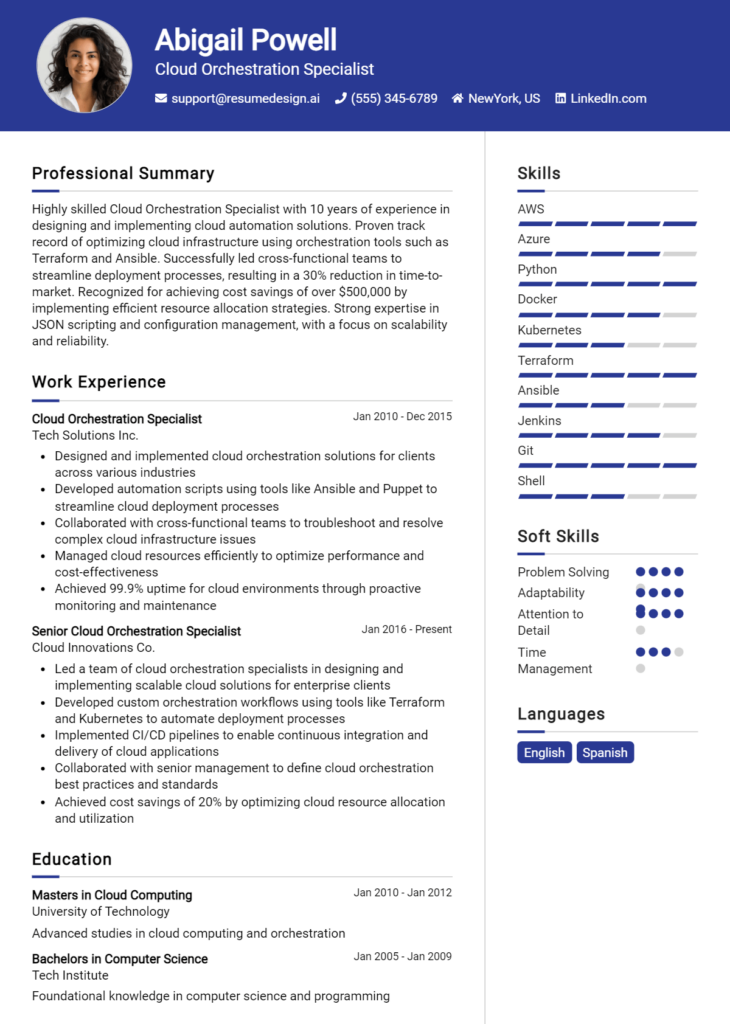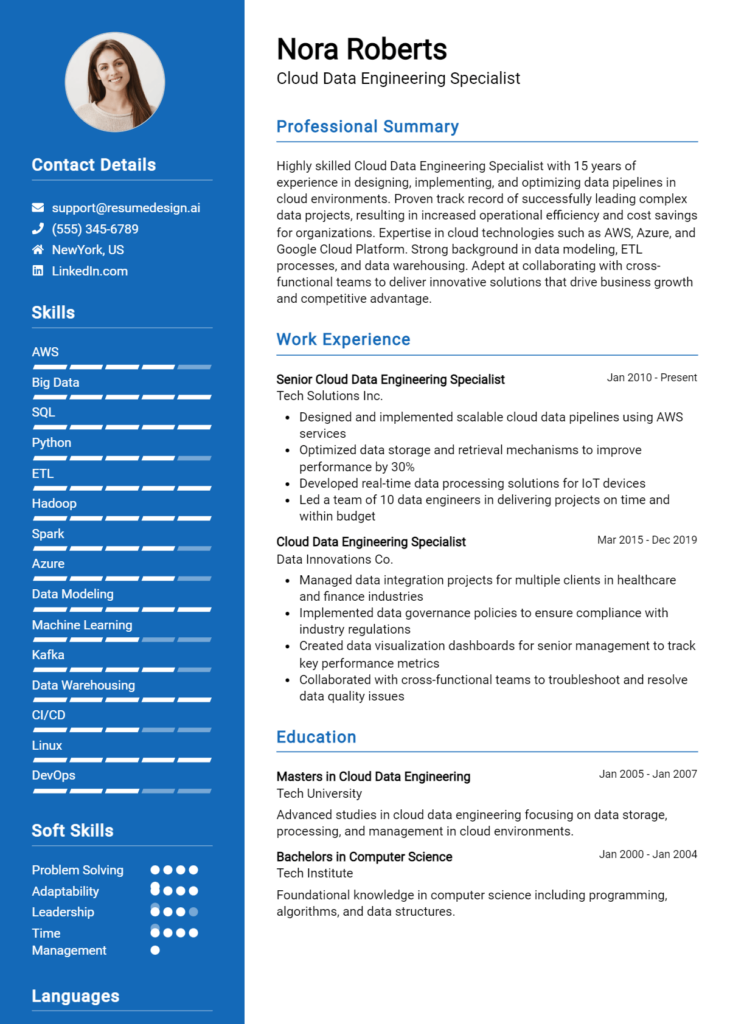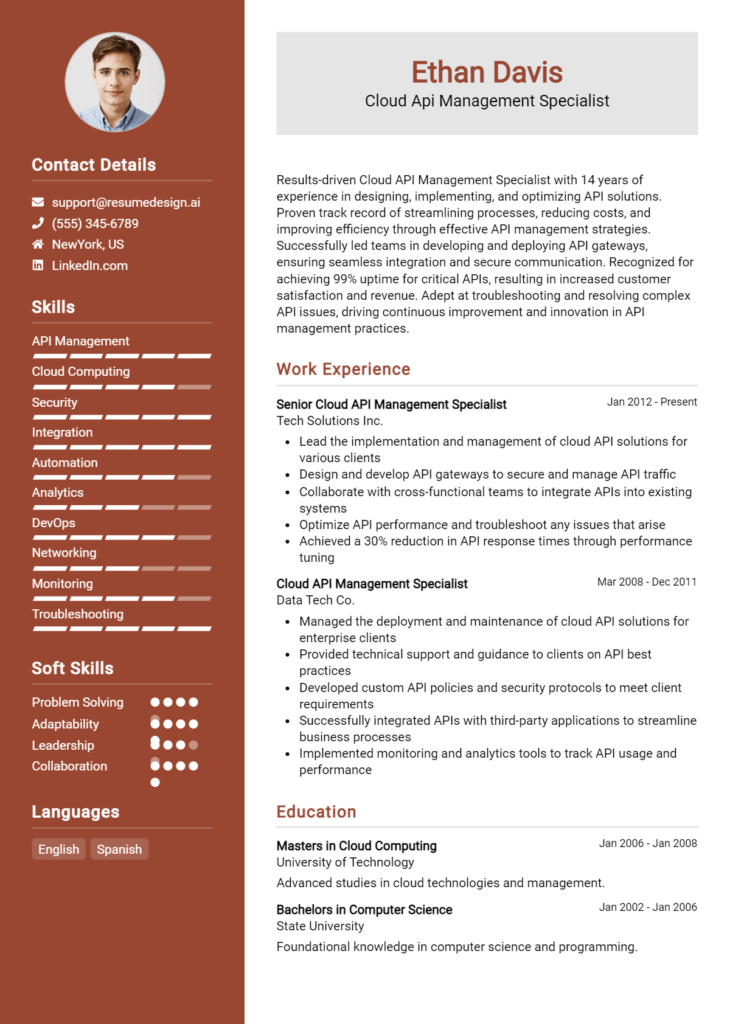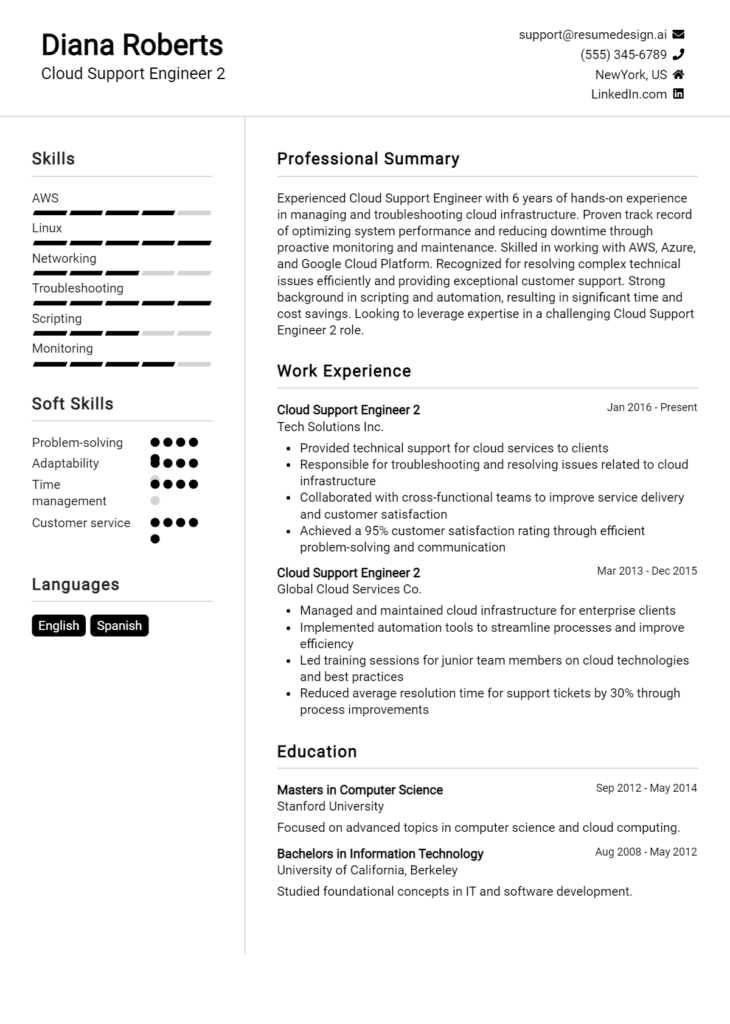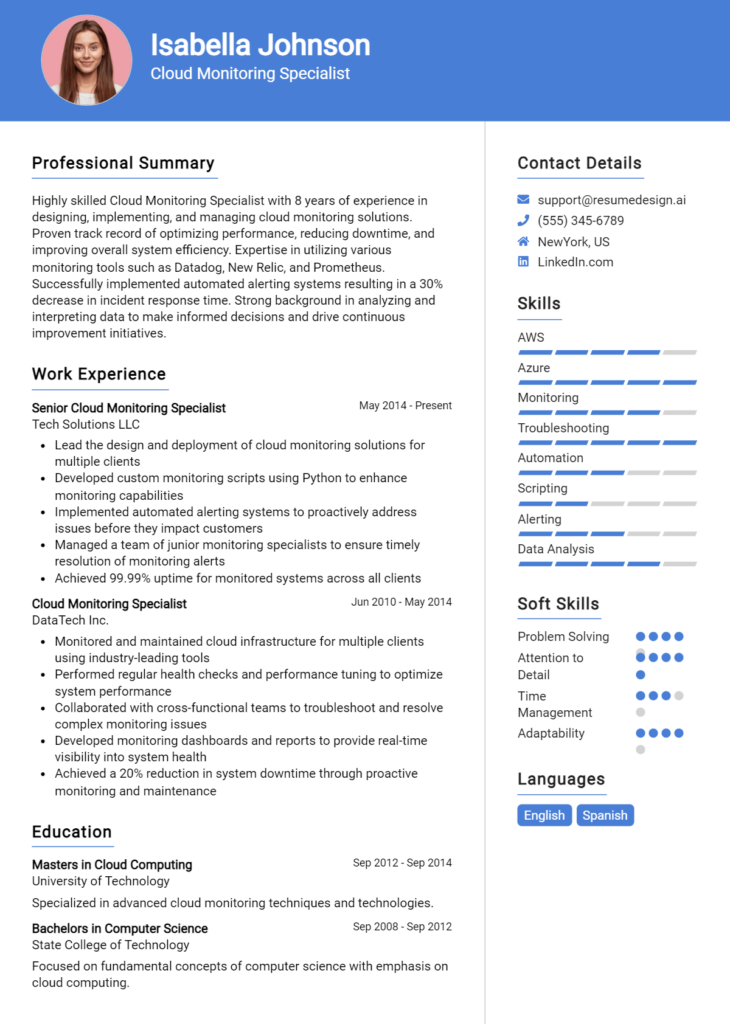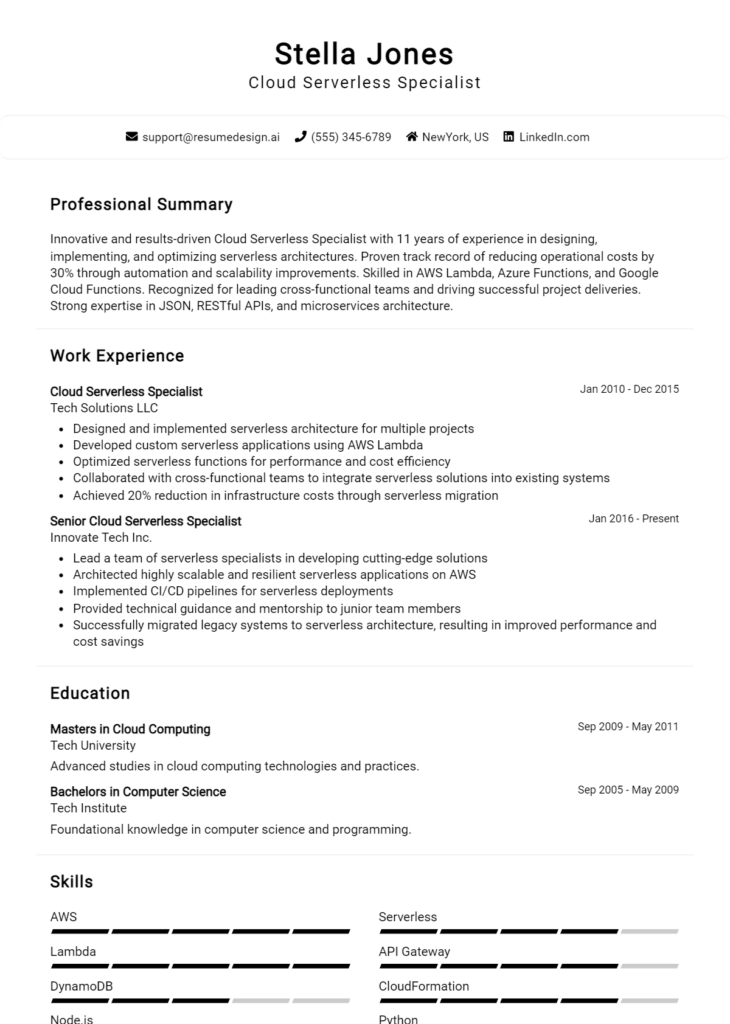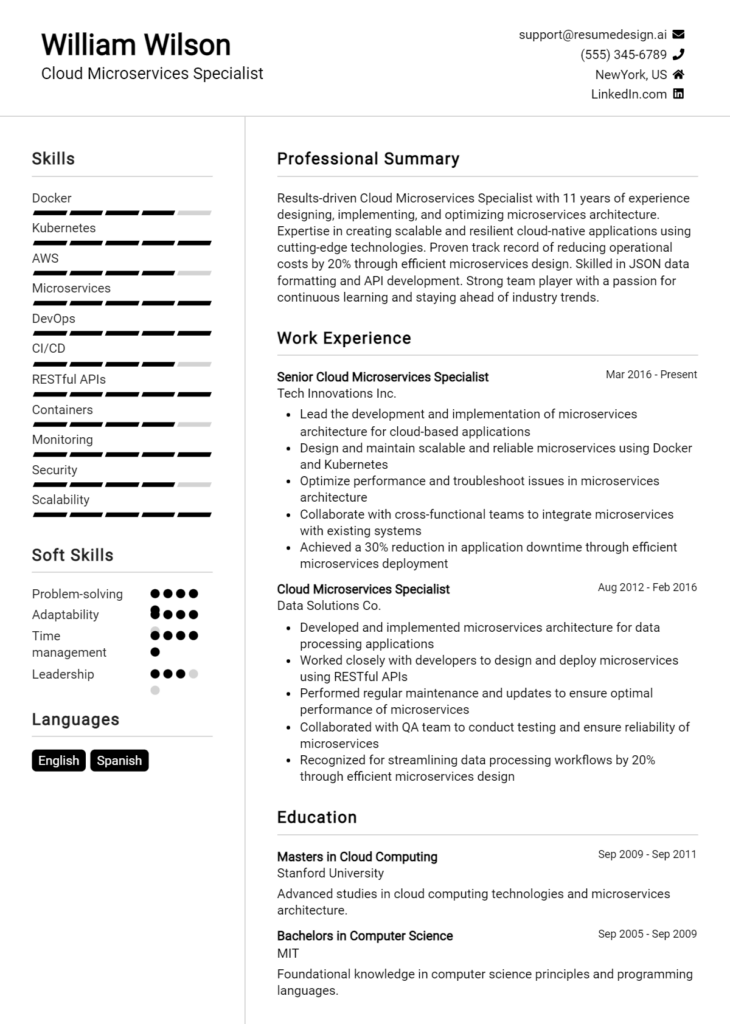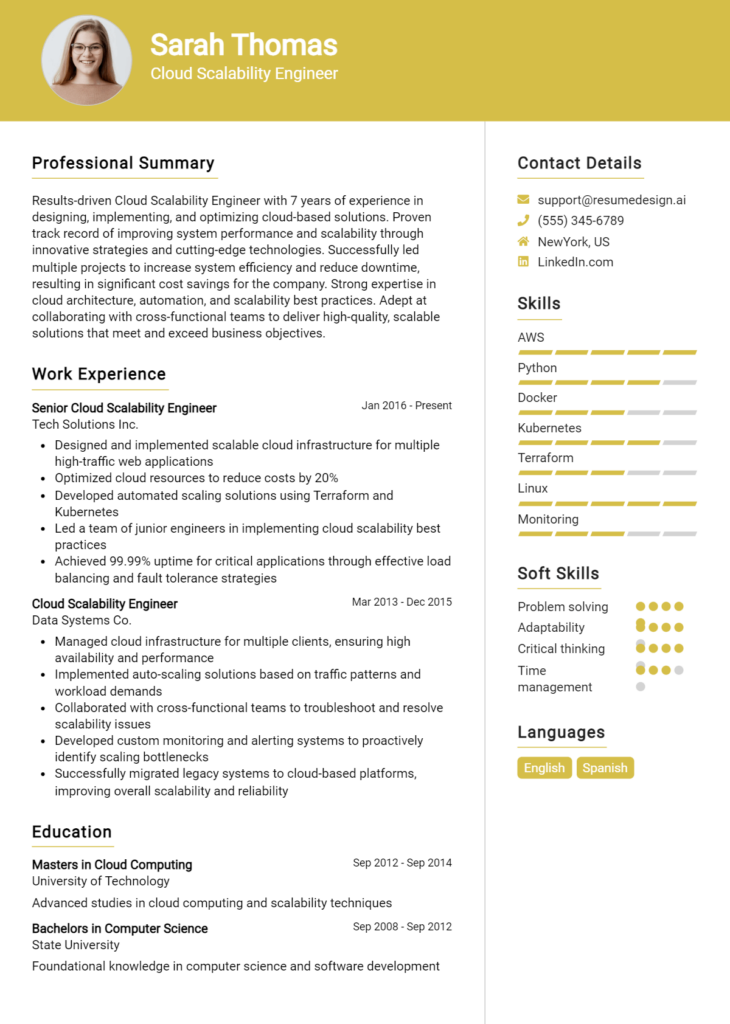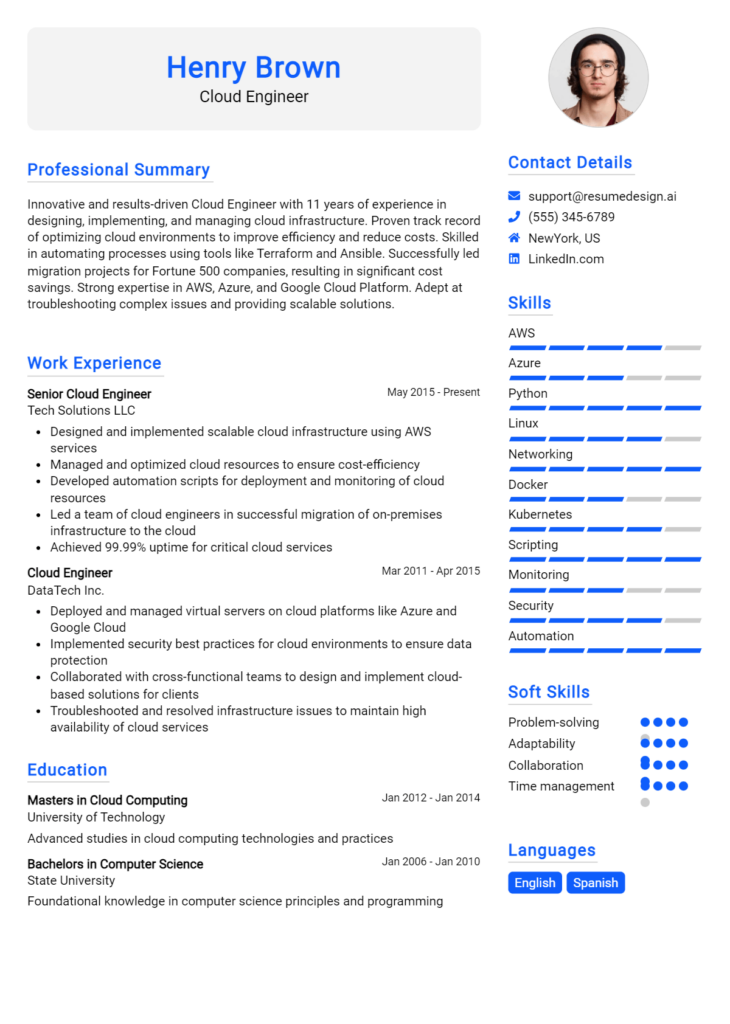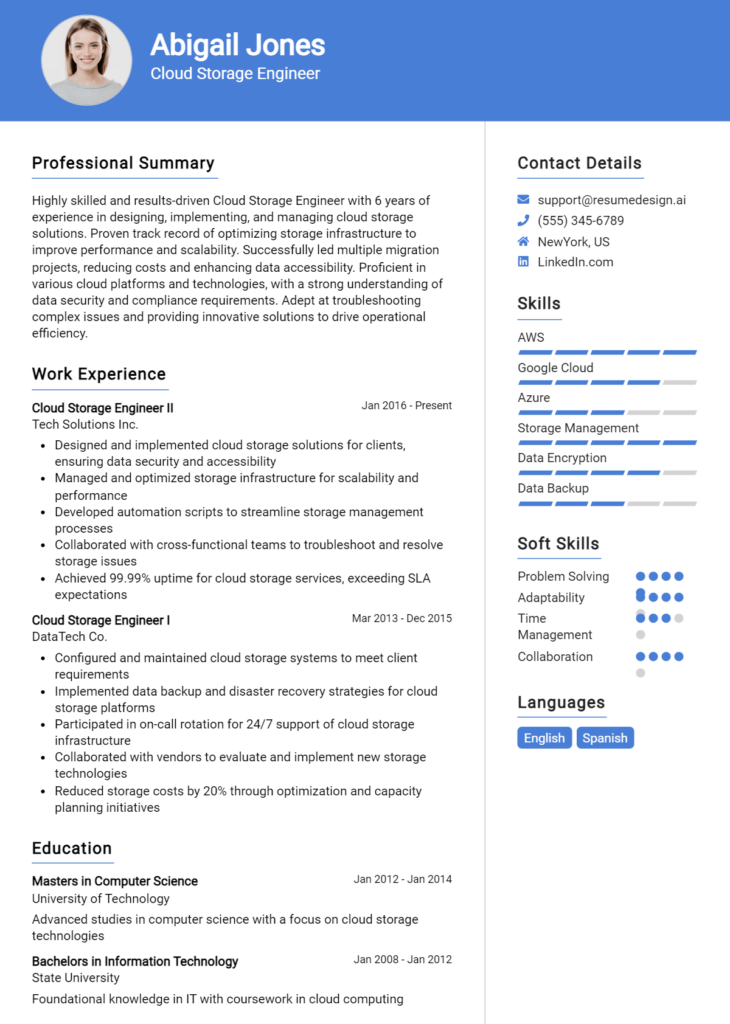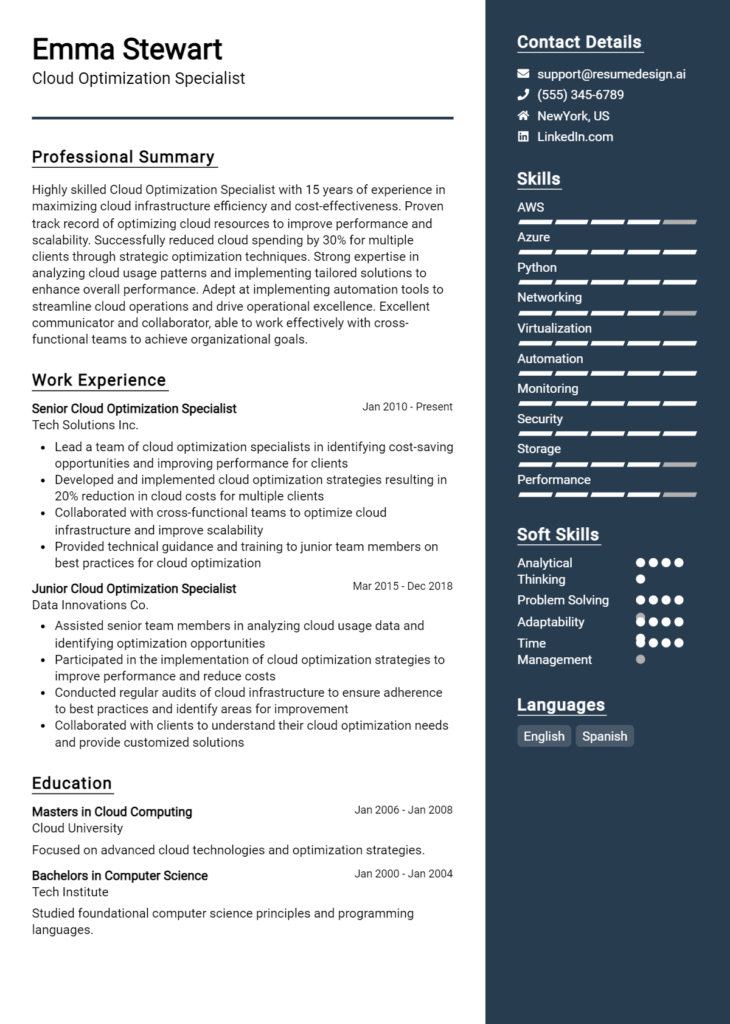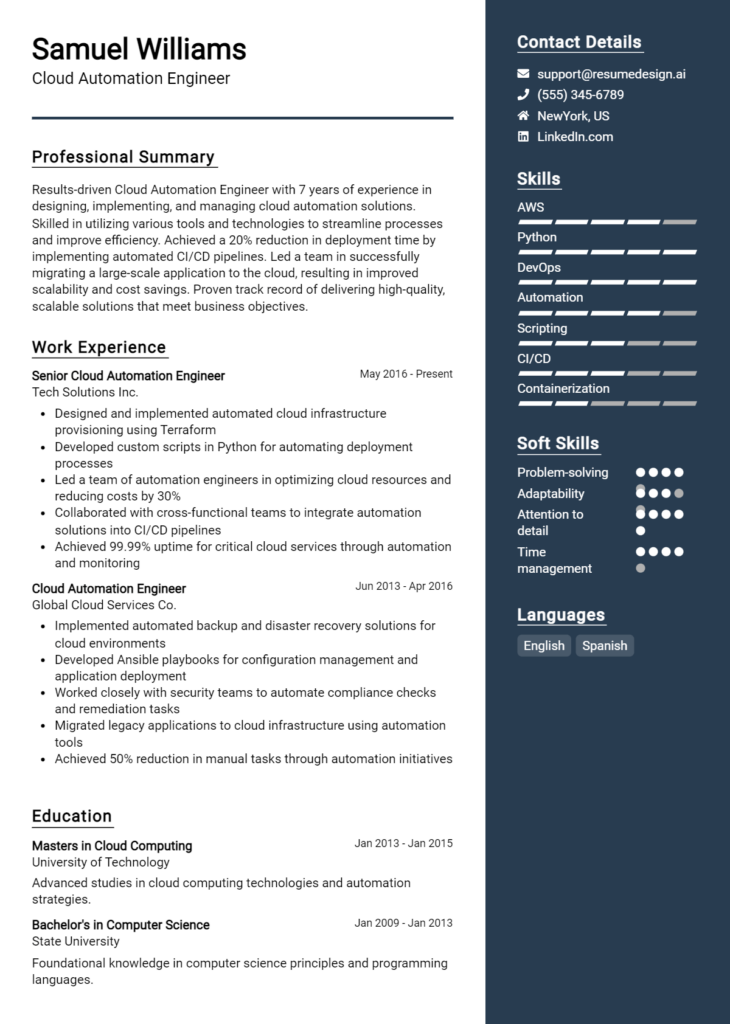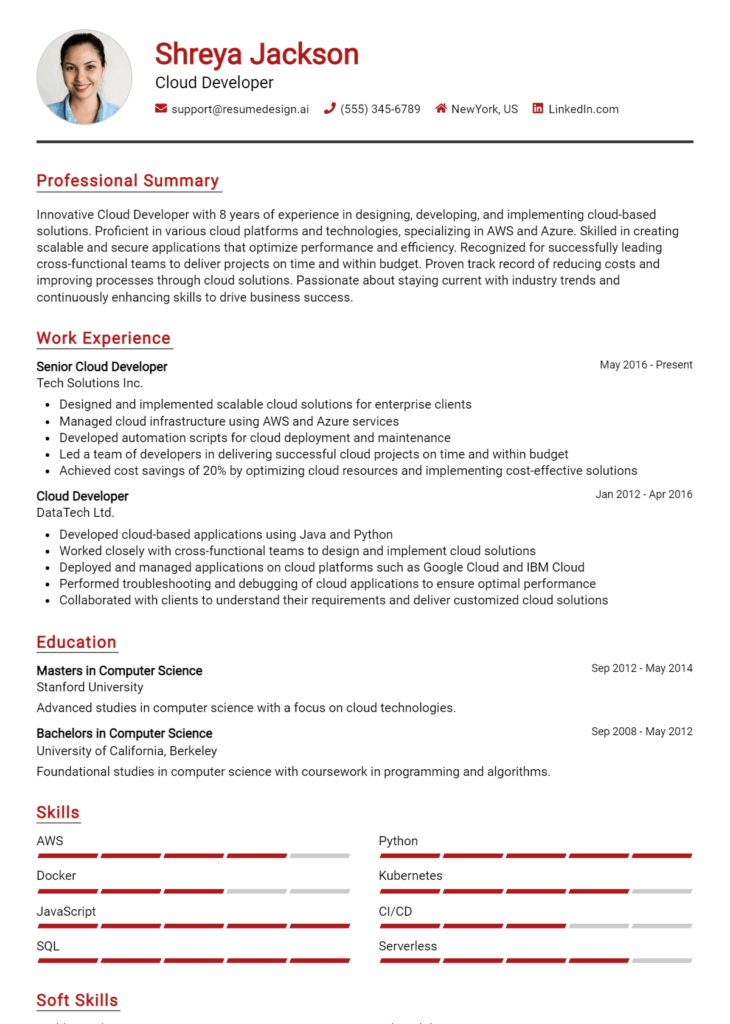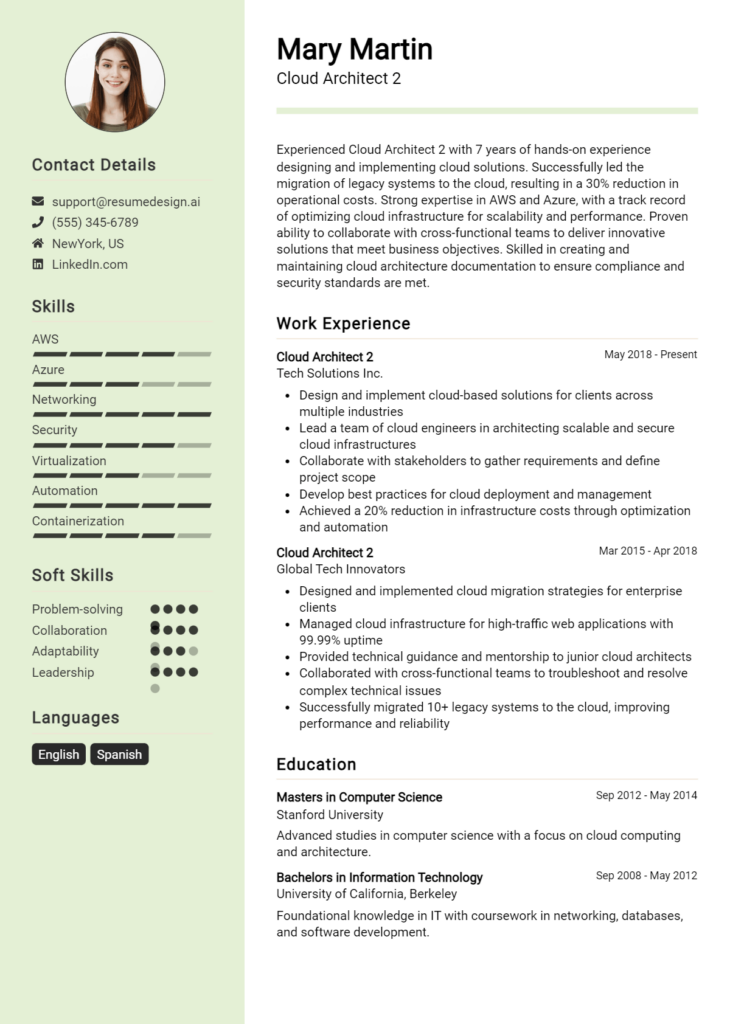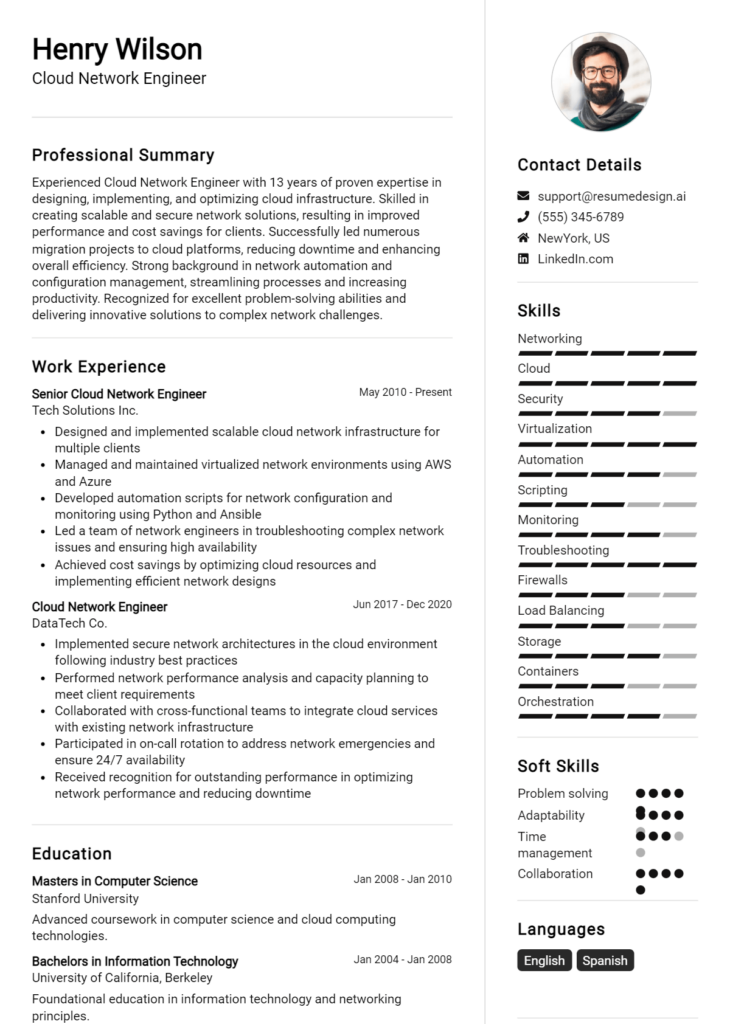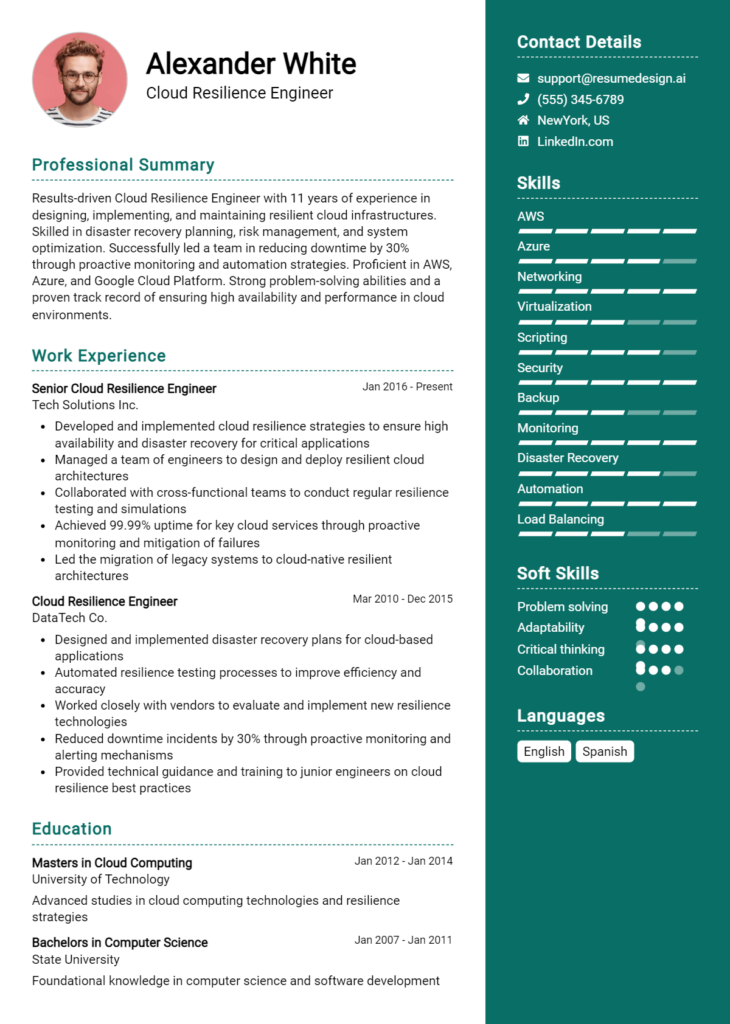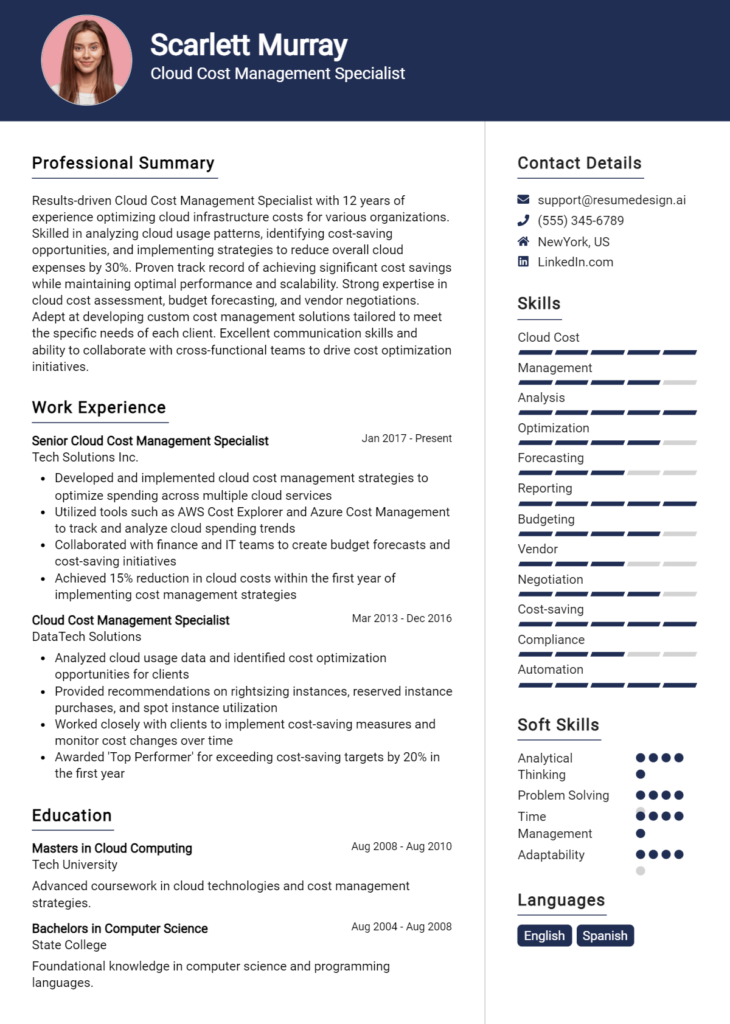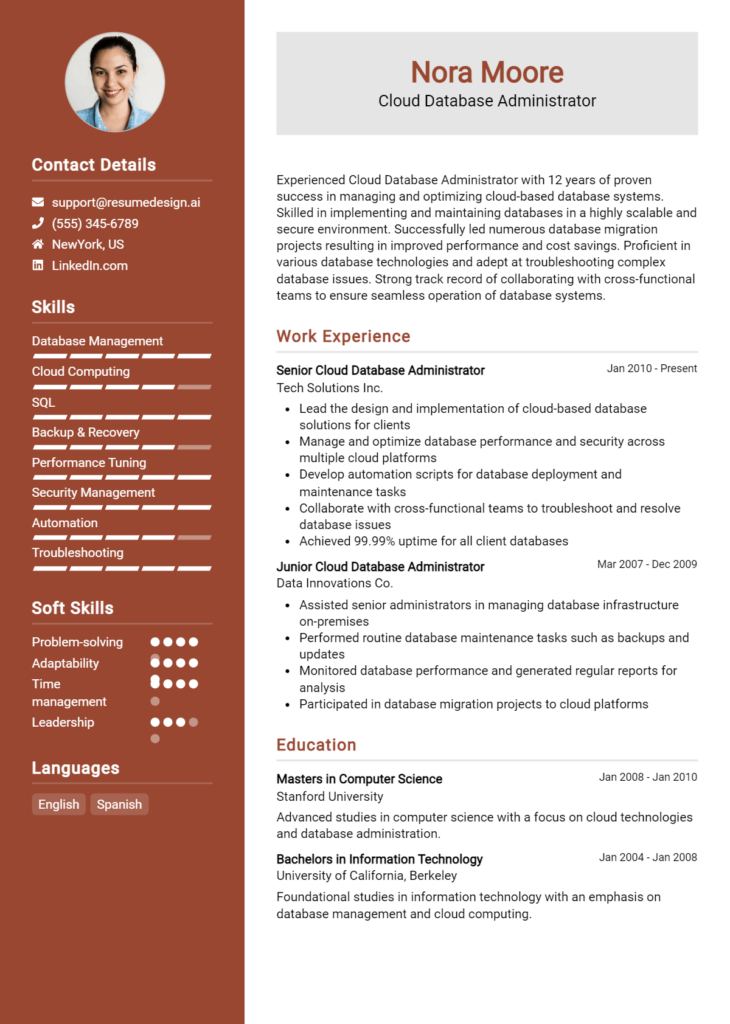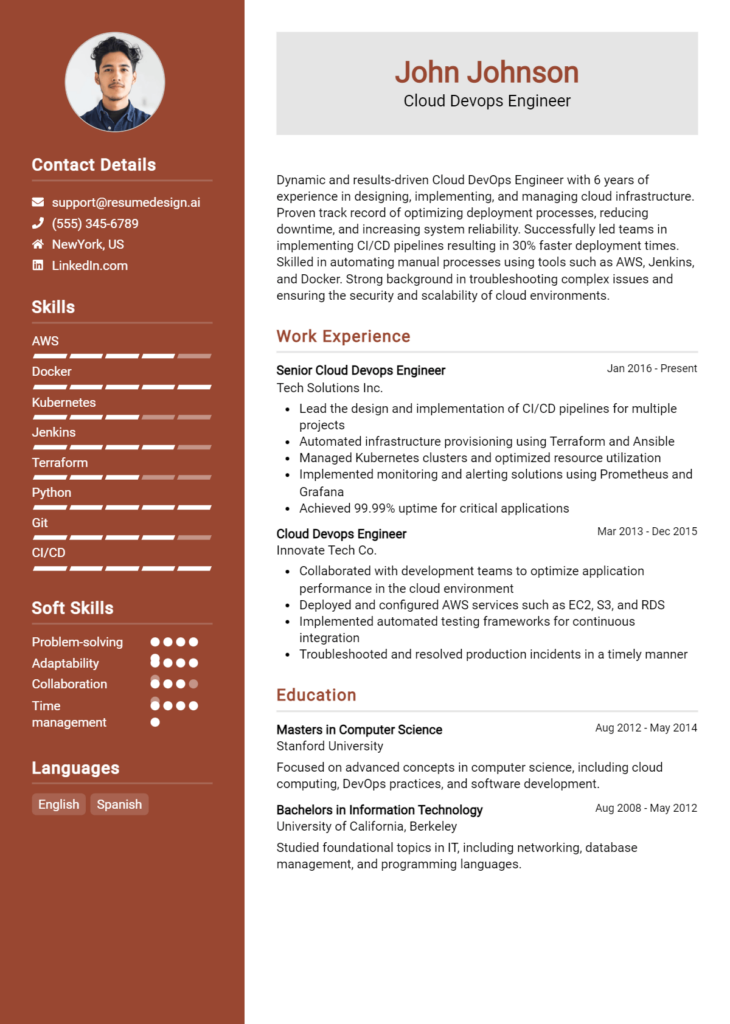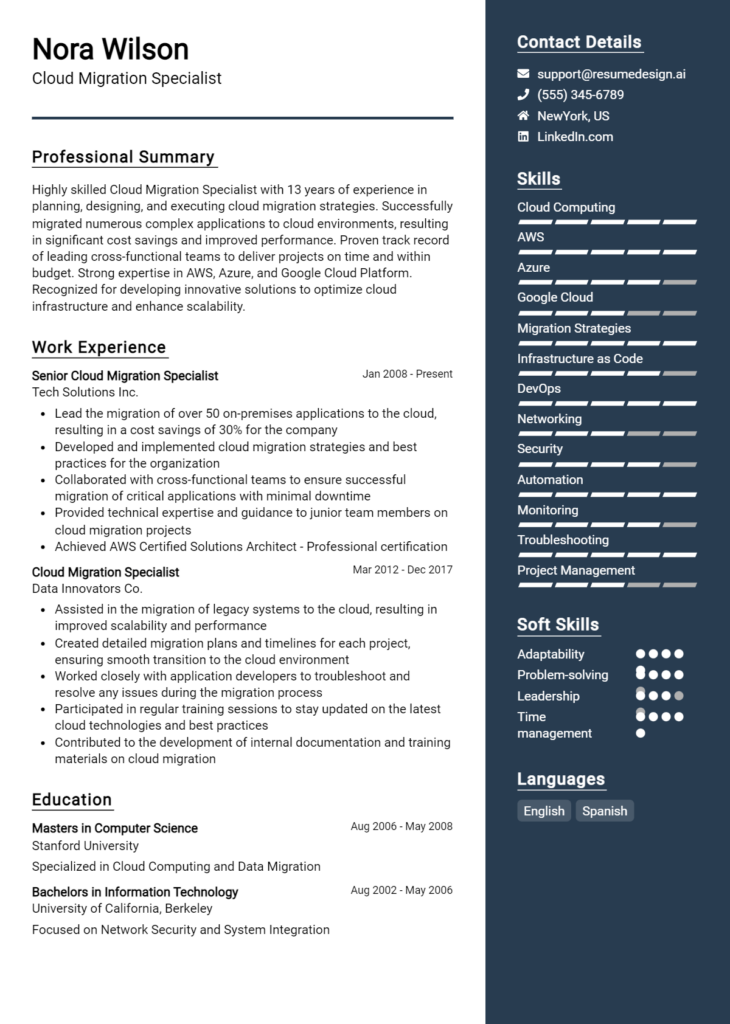Cloud Containerization Specialist Core Responsibilities
A Cloud Containerization Specialist plays a crucial role in integrating development and operations by implementing containerization technologies like Docker and Kubernetes. This position requires strong technical skills in cloud infrastructure, operational expertise in deploying and managing containerized applications, and problem-solving abilities to troubleshoot and optimize workflows. Effective communication skills are essential for collaborating across departments to align with organizational goals. A well-structured resume can highlight these qualifications, showcasing the specialist's ability to drive efficiency and innovation within the company.
Common Responsibilities Listed on Cloud Containerization Specialist Resume
- Design and implement container orchestration solutions using tools like Kubernetes.
- Develop, test, and deploy containerized applications in cloud environments.
- Manage and optimize container lifecycle management strategies.
- Monitor and troubleshoot containerized applications for performance issues.
- Collaborate with development teams to ensure seamless integration of container technologies.
- Automate deployment processes using CI/CD pipelines.
- Implement security best practices for containerized applications.
- Conduct training sessions for teams on containerization tools and techniques.
- Analyze and optimize cloud resource utilization for cost efficiency.
- Maintain documentation of containerization processes and architecture.
- Evaluate and recommend new container technologies and tools.
High-Level Resume Tips for Cloud Containerization Specialist Professionals
In today's competitive job market, a well-crafted resume is crucial for Cloud Containerization Specialist professionals looking to make a lasting first impression on potential employers. Your resume serves as a gateway, showcasing not only your technical skills but also your achievements in the field. It is essential that your resume effectively communicates your experience and highlights your unique qualifications in cloud containerization. This guide will provide practical and actionable resume tips specifically tailored for Cloud Containerization Specialist professionals, ensuring that your resume stands out among the competition.
Top Resume Tips for Cloud Containerization Specialist Professionals
- Tailor your resume to match the specific job description, using relevant keywords that align with the role.
- Highlight your experience with container orchestration tools such as Kubernetes, Docker Swarm, or Amazon ECS.
- Quantify your achievements by including metrics, such as reduced deployment times or improved system performance.
- Showcase your understanding of cloud service providers (CSPs) like AWS, Azure, or Google Cloud Platform.
- Include certifications relevant to cloud technologies and containerization, such as Certified Kubernetes Administrator (CKA) or Docker Certified Associate.
- Demonstrate your ability to work in DevOps environments, emphasizing collaboration with development and operations teams.
- List any experience with CI/CD pipelines, particularly those that utilize containerization for deployment.
- Use clear and concise language, focusing on your role in projects and the impact of your contributions.
- Incorporate industry-specific tools and technologies that are pertinent to cloud containerization.
- Keep your resume format clean and professional, ensuring easy readability for hiring managers.
By implementing these tips, you can significantly increase your chances of landing a job in the Cloud Containerization Specialist field. A well-optimized resume not only showcases your qualifications effectively but also positions you as a desirable candidate in a rapidly evolving industry.
Why Resume Headlines & Titles are Important for Cloud Containerization Specialist
In the competitive field of cloud containerization, a well-crafted resume headline or title serves as a critical first impression. It allows candidates to succinctly communicate their unique qualifications and expertise to hiring managers, making a strong case for why they should be considered for the role. A compelling headline can capture attention immediately, summarizing key skills, experience, or accomplishments in just a few impactful words. This not only sets the tone for the rest of the resume but also ensures that it aligns directly with the job being applied for, making it concise and relevant.
Best Practices for Crafting Resume Headlines for Cloud Containerization Specialist
- Keep it concise: Aim for a headline that is no longer than 10-12 words.
- Be specific: Use terminology and keywords that are relevant to cloud containerization.
- Highlight key strengths: Focus on your most impressive qualifications or achievements.
- Use action verbs: Start with dynamic words that convey your expertise and contributions.
- Tailor to the job: Customize your headline for each application to align with the job description.
- Showcase your value: Clearly indicate how your skills can benefit the employer.
- Avoid jargon: Use clear language that can be easily understood by hiring managers.
- Make it engaging: Use compelling phrases that draw interest and encourage further reading.
Example Resume Headlines for Cloud Containerization Specialist
Strong Resume Headlines
"Certified Cloud Containerization Specialist with 5+ Years of Experience in Kubernetes and Docker"
“Expert in Automating Cloud Deployments with Container Orchestration Solutions”
"Cloud Solutions Architect Specializing in Scalable Containerized Applications"
"DevOps Engineer with Proven Track Record in Containerization and Cloud Security"
Weak Resume Headlines
“Looking for a Job in IT”
“Experienced Professional”
“Cloud Specialist”
The strong headlines are effective because they are specific, highlight relevant skills, and convey a clear professional identity that aligns well with the role of a Cloud Containerization Specialist. They draw the reader's attention by showcasing the candidate's unique qualifications and establishing a strong connection to the job requirements. In contrast, the weak headlines fail to impress because they are vague and non-specific, offering no insight into the candidate's skills or how they relate to the position. This can result in a missed opportunity to stand out in a crowded job market.
Writing an Exceptional Cloud Containerization Specialist Resume Summary
A resume summary is a critical component for a Cloud Containerization Specialist, as it serves as the first impression for hiring managers reviewing applications. A well-crafted summary succinctly highlights the candidate's key skills, relevant experience, and notable accomplishments, effectively capturing the attention of recruiters in a competitive job market. It should be concise, impactful, and tailored to the specific role, allowing the candidate to quickly convey their value and alignment with the job requirements. A strong summary not only showcases technical expertise but also demonstrates the candidate's ability to contribute to the organization's cloud strategy and containerization initiatives.
Best Practices for Writing a Cloud Containerization Specialist Resume Summary
- Quantify achievements: Include specific metrics or outcomes to demonstrate impact.
- Focus on relevant skills: Highlight technical skills and tools pertinent to containerization and cloud technologies.
- Tailor the summary: Customize the summary to align with the job description and company values.
- Keep it concise: Aim for 3-5 sentences that encapsulate your professional identity and key contributions.
- Use action verbs: Start sentences with strong action verbs to convey a sense of proactivity.
- Showcase industry knowledge: Mention familiarity with industry trends and best practices in cloud containerization.
- Highlight certifications: Include relevant certifications or training that enhance credibility.
- Reflect soft skills: Incorporate interpersonal skills such as teamwork and communication that are valuable in collaborative environments.
Example Cloud Containerization Specialist Resume Summaries
Strong Resume Summaries
Dynamic Cloud Containerization Specialist with over 5 years of experience in deploying scalable applications using Docker and Kubernetes. Successfully reduced deployment times by 40% through automation and process optimization, leading to significant cost savings. Proven expertise in cloud architecture design and implementation for multi-cloud environments.
Results-driven Cloud Containerization Specialist with a track record of managing cloud-native applications for Fortune 500 companies. Achieved a 30% increase in application performance while reducing infrastructure costs by 25%. Proficient in CI/CD pipelines, container orchestration, and microservices architecture.
Innovative Cloud Containerization Expert with certifications in AWS and Azure, specializing in containerization strategies that enhance scalability and resilience. Spearheaded a project that migrated 50+ legacy applications to a containerized environment, resulting in 50% faster recovery times and improved system reliability.
Weak Resume Summaries
Experienced IT professional with knowledge of cloud technologies and containerization. Looking for opportunities to apply skills in a new job.
Cloud specialist with some experience in containers and cloud-related tasks. Interested in a role where I can grow my career.
The examples of strong resume summaries effectively illustrate the candidate's accomplishments, include specific metrics to quantify their impact, and showcase relevant skills and certifications. In contrast, the weak summaries lack detail, fail to provide measurable outcomes, and come across as generic, making it difficult for hiring managers to gauge the candidate's true capabilities and relevance for the Cloud Containerization Specialist role.
Work Experience Section for Cloud Containerization Specialist Resume
The work experience section of a Cloud Containerization Specialist resume is crucial as it serves to highlight the candidate's technical skills, management capabilities, and the ability to deliver high-quality products in fast-paced environments. This section not only demonstrates a candidate's hands-on experience with cloud technologies and container orchestration tools but also showcases their leadership abilities in managing teams and driving project success. By quantifying achievements and aligning their experience with industry standards, candidates can effectively communicate their value to potential employers, setting themselves apart in a competitive job market.
Best Practices for Cloud Containerization Specialist Work Experience
- Highlight relevant technical skills such as Kubernetes, Docker, and CI/CD pipelines.
- Quantify achievements with metrics, such as reduced deployment times or improved system uptime.
- Demonstrate leadership by detailing experiences managing teams or leading projects.
- Align experiences with industry standards and emerging trends in cloud technologies.
- Include collaborative projects that showcase teamwork and cross-functional communication.
- Tailor each experience to reflect the specific requirements of the job you are applying for.
- Use action verbs to describe your contributions and responsibilities effectively.
- Focus on results and impact, illustrating how your work contributed to organizational goals.
Example Work Experiences for Cloud Containerization Specialist
Strong Experiences
- Led the migration of over 100 microservices to a Kubernetes environment, resulting in a 30% increase in deployment efficiency and a 25% reduction in infrastructure costs.
- Implemented a CI/CD pipeline that reduced release cycle time from two weeks to three days, significantly enhancing project turnaround for the development team.
- Managed a cross-functional team of 10 engineers in a cloud-native application project, which achieved a 99.9% uptime and improved customer satisfaction scores by 40%.
- Developed and executed training programs for staff on best practices for containerization, leading to an 80% increase in team proficiency with Docker and Kubernetes.
Weak Experiences
- Worked on cloud projects that involved containers.
- Helped the team with deployment tasks.
- Participated in meetings about cloud strategies.
- Assisted in the development of applications in a cloud environment.
The examples categorized as strong experiences are characterized by their specificity, quantifiable outcomes, and demonstrated leadership and collaboration. They provide clear evidence of the candidate's impact on the organization and their technical expertise. In contrast, the weak experiences lack detail and measurable results, making them less compelling for potential employers. Vague statements fail to showcase the candidate's unique contributions and competencies in cloud containerization.
Education and Certifications Section for Cloud Containerization Specialist Resume
The education and certifications section of a Cloud Containerization Specialist resume is a critical component that showcases the candidate's academic qualifications and professional development in a rapidly evolving field. By highlighting relevant degrees, industry-recognized certifications, and specialized training, this section establishes the candidate's credibility and demonstrates their commitment to continuous learning. It serves as a vital indicator of the candidate's technical expertise and alignment with the demands of the role, making it essential for potential employers to assess qualifications at a glance.
Best Practices for Cloud Containerization Specialist Education and Certifications
- Include only relevant degrees and certifications that pertain to cloud technologies and containerization.
- Clearly list certifications from recognized organizations, such as AWS, Google Cloud, or Docker.
- Detail specialized training programs or workshops that focus on container orchestration tools like Kubernetes.
- Provide context for certifications by mentioning completion dates and any notable projects or experiences related to them.
- Highlight advanced degrees, such as a Master's in Cloud Computing or Software Engineering, to stand out.
- Incorporate relevant coursework that supports your expertise in cloud architecture and containerization techniques.
- Use a clean and organized format for easy readability, ensuring the most relevant qualifications are at the top.
- Regularly update this section to reflect new certifications or relevant educational experiences to stay current in the field.
Example Education and Certifications for Cloud Containerization Specialist
Strong Examples
- Bachelor of Science in Computer Science, XYZ University, 2020
- AWS Certified Solutions Architect – Associate, 2022
- Docker Certified Associate, 2021
- Completed coursework in Cloud Computing and Containerization Technologies, ABC Institute, 2021
Weak Examples
- Associate Degree in General Studies, DEF College, 2018
- Certification in Basic Computer Skills, 2019
- Outdated certification in Windows Server Administration, 2017
- High School Diploma, GHI High School, 2016
The strong examples presented above are considered robust because they directly relate to the skills and knowledge required for a Cloud Containerization Specialist role, showcasing relevant degrees and up-to-date certifications that reflect the candidate's expertise. In contrast, the weak examples lack relevance to the position, featuring outdated or basic qualifications that do not demonstrate the necessary technical competencies or advanced understanding of cloud containerization practices.
Top Skills & Keywords for Cloud Containerization Specialist Resume
A well-crafted resume for a Cloud Containerization Specialist should emphasize both hard and soft skills crucial for success in the field. As organizations increasingly adopt cloud technologies, the demand for specialists who can efficiently deploy, manage, and troubleshoot containerized applications is on the rise. Highlighting the right skills in your resume not only showcases your qualifications but also aligns your capabilities with the expectations of potential employers. With a mix of technical expertise and interpersonal qualities, you can demonstrate your comprehensive understanding of cloud containerization and your ability to collaborate effectively within a team.
Top Hard & Soft Skills for Cloud Containerization Specialist
Soft Skills
- Problem-solving
- Communication
- Team collaboration
- Adaptability
- Time management
- Critical thinking
- Attention to detail
- Creativity
- Customer-oriented mindset
- Conflict resolution
Hard Skills
- Proficiency in Docker and Kubernetes
- Cloud platforms (AWS, Azure, Google Cloud)
- Continuous Integration/Continuous Deployment (CI/CD)
- Networking fundamentals
- Scripting languages (Python, Bash)
- Configuration management tools (Ansible, Terraform)
- Monitoring and logging tools (Prometheus, ELK Stack)
- Container orchestration
- Security best practices for containerization
- Understanding of microservices architecture
For a deeper look into the essential skills and how to effectively showcase your work experience on your resume, consider these key areas as you prepare your application.
Stand Out with a Winning Cloud Containerization Specialist Cover Letter
I am excited to apply for the Cloud Containerization Specialist position at [Company Name], as advertised on [Job Board/Company Website]. With a solid background in cloud technologies and container orchestration, combined with my passion for streamlining application deployment processes, I am confident in my ability to contribute to your team. My experience with platforms like Docker and Kubernetes enables me to create efficient, scalable, and maintainable containerized applications, aligning perfectly with [Company Name]'s goals of innovation and excellence in cloud solutions.
In my previous role at [Previous Company Name], I successfully led the implementation of containerization strategies that reduced deployment times by 40% and improved system reliability. I collaborated closely with cross-functional teams to design and deploy microservices architecture, ensuring seamless integration and deployment using CI/CD pipelines. My hands-on experience with cloud service providers such as AWS and Azure has equipped me with the skills to optimize resource allocation and manage costs effectively, allowing for a robust cloud infrastructure that supports dynamic workloads.
I am particularly drawn to [Company Name] because of its commitment to leveraging cutting-edge technologies to solve complex challenges. I am eager to bring my expertise in container orchestration and cloud infrastructure management to your team. My proactive approach to problem-solving, coupled with my dedication to staying up-to-date with industry trends, positions me to make a significant impact on your projects. I am enthusiastic about the opportunity to contribute to [Company Name]'s mission and help drive its cloud initiatives forward.
Thank you for considering my application. I look forward to the opportunity to discuss how my background and skills align with the needs of your team. I am eager to bring my passion for cloud technologies and containerization to [Company Name] and contribute to your continued success.
Common Mistakes to Avoid in a Cloud Containerization Specialist Resume
When crafting a resume for a Cloud Containerization Specialist position, it’s crucial to present your skills and experiences effectively to stand out in a competitive job market. However, many candidates make common mistakes that can hinder their chances of landing an interview. Avoiding these pitfalls will help you create a polished and impactful resume that highlights your expertise in cloud technologies and containerization.
Lack of Tailoring: Failing to customize your resume for each job application can result in a generic document that does not address the specific requirements of the position.
Overloading Technical Jargon: While technical skills are important, using excessive jargon can confuse hiring managers. Focus on clarity and ensure that your technical skills are presented in an understandable manner.
Ignoring Keywords: Many companies use Applicant Tracking Systems (ATS) to filter resumes. Not including relevant keywords from the job description can lead to your resume being overlooked.
Neglecting Soft Skills: While technical expertise is essential, overlooking soft skills such as teamwork, communication, and problem-solving can diminish your appeal as a well-rounded candidate.
Inadequate Project Descriptions: Simply listing projects without detailing your specific contributions or the technologies used can make it difficult for employers to assess your experience and impact.
Outdated Information: Ensure that your resume reflects your most current skills and experiences. Outdated information can signal to employers that you are not keeping pace with industry developments.
Poor Formatting: A cluttered, overly complex, or inconsistent format can detract from your content. Aim for a clean, professional layout that enhances readability.
Ignoring Achievements: Failing to highlight measurable achievements or improvements you contributed to can leave your resume lacking. Quantifying your impact (e.g., "improved deployment speed by 30%") can help demonstrate your value.
Conclusion
As we conclude our exploration of the Cloud Containerization Specialist role, it's essential to emphasize the critical skills and experiences that make a candidate stand out in this evolving field. We discussed the importance of proficiency with container orchestration platforms like Kubernetes, familiarity with cloud service providers, and a solid understanding of DevOps principles. Additionally, we highlighted the necessity of strong problem-solving skills and the ability to work collaboratively in diverse teams.
In today’s competitive job market, having a polished and tailored resume is key to grabbing the attention of potential employers. We encourage you to take a moment to review and refine your Cloud Containerization Specialist resume. Utilize available resources to enhance your application materials:
- Explore a variety of resume templates that can help you present your skills and experience effectively.
- Use our resume builder for a user-friendly way to create a professional-looking resume tailored to your unique career journey.
- Check out resume examples to see how other professionals in your field have successfully showcased their qualifications.
- Don’t forget to craft an impactful cover letter with our cover letter templates that complements your resume.
Taking these steps can significantly enhance your chances of landing your desired position in the cloud containerization space. Start refining your resume today!

